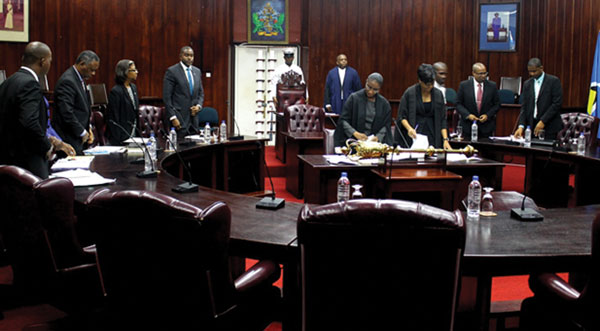THE annual parliamentary budget debate is on again –and the Government and Opposition are at it again.
But then, that’s the essence of our democracy: Governments will govern and Opposition sides will oppose, even if there is no opposition — as in Grenada again.
Our Westminster model is so elastic that it takes no stretch of the imagination for MPs to decide if and when they care to legally overcome its procedural checks and balances. Parliamentary debates can therefore sometimes amount to sounding like annual jawbone exercises. But, thankfully, not always.
What comes out of every budget, from presentation to approval and adoption, largely depends on what each side comes to the parliamentary table with.
To the best they can, both parliamentary parties here do prepare. The ruling party takes advantage of being in the driver’s seat and the opposition will question every major government proposal on behalf of the 43% it represents.
At the end of the day, the numbers will play — and today they clearly show which side will ‘have it’ when Mr Speaker puts the question to the House.
But it’s what happens The Morning After that always matters. Government has to every day pay the nation’s bills — and if that’s not done properly, the national debt grows higher and faster, with citizens paying even more.
As elected guardians of the public purse, the opposition’s role is always to keep its eye on the people’s bank account.
The institutional modalities of our annual Throne Speech and Budget Debate process can sometimes seem more traditional than real. But they do allow both sides opportunities to assure the 100% they represent that each has them all in their hearts.
Ultimately, it’s the MPs who’ll all decide whether each annual national budget exercise will be remembered as a trumpet for truths or a fountain of fallacies.
Love and Loyalty
Two events this past week attracted global and local attention: the death of South African freedom fighter Winnie Mandela and the 50th Anniversary of the assassination of US Civil Rights leader Martin Luther King.
Nelson Mandela’s wife will forever be remembered as more than a housewife, mother, or companion. She marched by his side and continued marching along South Africa’s Freedom Road without him for nearly three decades while he was jailed.
Some will point to her human frailties or her penchant for adopting more extreme approaches to solving problems than her husband would. But Winnie’s personal contribution to her country’s struggle for liberation will always far outweigh whatever negative character molds she may have developed along the way.
Martin Luther King is more than just an American legend. But in many ways also, Coretta Scott King was more than just his wife.
Mrs King indeed played a leading role in the politicization of Reverend Dr King’s religious mission on behalf of his national congregation. She delivered her own speeches, wrote some of his and represented him at key international gatherings where his presence was valued.
Coretta was a quiet Winnie. After dying, Mrs King was appropriately honored, her funeral given historic national stature with personal presidential presence and approval.
Winnie has joined her hero husband as a heroine in her own right.
Like Nelson and Winnie, Martin and Coretta also bequeathed legacies that young couples around the world still aspire to emulate.
Theirs are two continental stories of love and loyalty tested by the brutal realities of life in societies engineered by racial superiority.
May they all rest in eternal peace!













